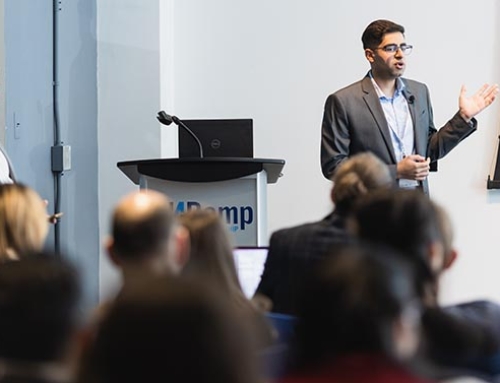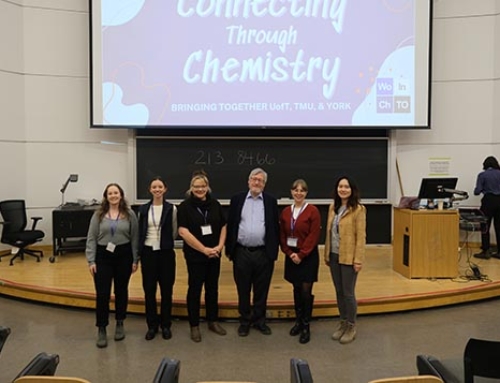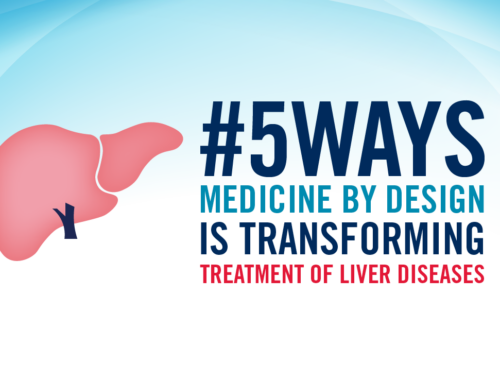
The Pitch Competition will feature six teams selected from teams that completed the Building a Biotech Venture program. They will present in front of expert judges for a chance to receive one of two research grants, $25,000 or $10,000. (Image from Getty Images.)
A platform that can help prevent cancer relapse. A gene therapy that has the potential to reprogram toxic brain cells. A pipeline for developing rare disease therapeutics.
These are just a few of the regenerative and precision medicine advancements that trainees — post-graduate students, post-doctoral fellows and research and scientific associates — at the University of Toronto (U of T) and its affiliated hospitals are developing. And on May 30, six trainee-led teams will pitch their ideas in front of expert judges for the chance to receive one of two research funding grants, valued at $25,000 and $10,000.
“We are committed to empowering the next generation of entrepreneurial researchers to start thinking early on about how their discoveries can become products and ventures that will benefit human health,” says Allison Brown, who is the director of strategy & translation at Medicine by Design. “The Pitch Competition is not only a way for teams to refine their initial business case and receive feedback from seasoned entrepreneurs and industry leaders, but it is also providing some seed funding for two of the ventures with the highest potential to become companies.”
The Pitch Competition is the culmination of the Building a Biotech Venture program, a collaboration between Medicine by Design, an initiative that drives regenerative medicine research at U of T and its affiliated hospitals toward clinical impact; the Precision Medicine Initiative (PRiME), a U of T initiative that aligns research efforts in the area of precision medicine; the Health Innovation Hub (H2i), a campus-linked accelerator at U of T’s Temerty Faculty of Medicine; and Talk Boutique, a full-service speaker representation and coaching company.
This is the second year of the program. This year, the program expanded with PRiME joining as a partner; enhanced educational and supportive programming; and more research funding dollars available at the Pitch Competition.
“Thanks to the joint efforts of the program partners, over the past six months participants have attended a series of workshops and have received mentorship and coaching,” says Mark Pereira, PRiME’s director of strategy & partnerships. “All of the 10 teams who went through the program have gained a solid understanding of the early stages of venture formation. We’re excited to showcase six teams from the program that are ready to present in front of judges.”
The community is invited to watch the competition, where each team will pitch for five minutes in front of a panel of four judges, who are experts in entrepreneurship and venture development. The judging panel is as follows:
- Alberto Galasso, PhD, Professor of Strategic Management, Rotman School of Management, University of Toronto
- Ella Korets-Smith, MBA, MSc, Chief Business Officer, Virica Biotech
- Angela McDonald, PhD, Entrepreneur-in-Residence, Versant Ventures
- Robin Quirk, PhD, MBA, Vice President, Technology Sourcing & Venture Development, CCRM
H2i, which has supported more than 500 companies across all three U of T campuses since its inception in 2014, provided coaching and mentoring opportunities to the teams.
“Participating in the Building a Biotech Venture program has given us an opportunity to work with these up-and-coming entrepreneurs as they explore ideas, build business concepts and refine their pitching skills,” says Paul Santerre, director of H2i and a professor at the Faculty of Dentistry and the Institute of Biomedical Engineering at U of T. “I anticipate successful advances for the ventures well beyond this program. Seven teams from last year are still active with the support of H2i and Toronto’s entrepreneurial ecosystem. They’re winning pitches, negotiating investments and advancing their IP. Two of them are participating in Creative Destruction Lab, a more advanced program.”
One of the main goals of Building a Biotech Venture is to prepare the teams to be successful in programs like the Creative Destruction Lab (CDL), a Medicine by Design partner, and to be ready to participate in CDL’s Health Stream, which will connect them with investors and venture funding opportunities.
Meet the teams
Six teams were selected for their potential to contribute to the regenerative and precision medicine ecosystem.

Delivering the promise of RNA therapy
Azane Therapeutics
Lab: Institute of Biomedical Engineering and Department of Immunology, University of Toronto
This company’s product, a delivery vehicle for mRNA-based therapies, has the potential to make it possible for rare diseases to be treated with mRNA. The platform could also apply to regenerative medicine treatments such as stem cell reprogramming and inflammatory disorders.
DTPX Therapeutics
Labs: Princess Margaret Cancer Centre, University Health Network; and Donnelly Centre for Cellular and Biomolecular Research, University of Toronto.
When individuals are treated for colorectal cancer with standard chemotherapy, a cell population that’s resistant to treatment can “hibernate” and re-emerge after treatment, causing the tumour to relapse. DTXP Therapeutics aims to create a platform that can selectively target these hibernating cells to reduce the chance of relapse, potentially benefiting many types of cancer.
Developing immunotherapy against hibernating drug tolerant cancer cells for colorectal cancer patients
Glusyn Diagnostics
Lab: Leslie Dan Faculty of Pharmacy, University of Toronto.
With mastitis in dairy cows as a use-case, this teams aims to develop automated PCR-free diagnostic systems that are shelf-stable and have low manufacturing costs.
Automated PCR-free diagnostic systems for rapid, low-cost, distributed usage
A2O
Lab: Division of Anatomy, University of Toronto.
A2O has developed a type of gene therapy to convert toxic brain cells back into healthy cells to treat chronic neurodegenerative disease such as multiple sclerosis and Alzheimer’s disease, as well as acute neurological injuries such as spinal cord injury. This therapy allows for a targeted approach that can be tailored to disease type, stage or severity.
Reprogramming for recovery
One Drug

Enabling next generation drugs
Labs: Leslie Dan Faculty of Pharmacy, University of Toronto; Institute of Biomedical Engineering, University of Toronto; and Department of Chemistry, University of Toronto.
Developing clinical point-of-care diagnostic devices that will enable clinicians and drug developers identify patients at risk of adverse drug reactions and/or suboptimal drug response based on their genetic makeup.
Scivance

Developing therapeutics for rare disease
Lab: Department of Chemical & Physical Sciences, University of Toronto Mississauga
Only five percent of rare diseases have treatments, and a substantial portion of these rare diseases are caused by genes called fusion oncogenes. This team is developing a proprietary algorithm and multi-disciplinary pipeline which lies at the intersection of medicinal chemistry, structural biophysics and molecular biology, which can help develop treatments for these disease drivers.






